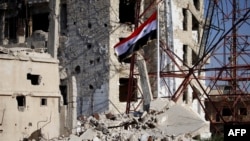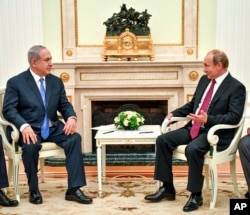Syrian government forces continue to regain ground in the south of the country, moving closer to the demarcation line with the Israeli-occupied Golan Heights. Meanwhile, Israel continues to urge Russia to prevent Iranian and pro-Iranian militia forces from getting too close to that line, following a visit to Moscow Wednesday by Prime Minister Benjamin Netanyahu.
Syrian state TV showed video of an army officer entering a cave filled with ammunition, which he claimed was supplied to "rebel" forces by Western nations. The TV also showed two British-built armored personnel carriers it said were supplied to the "rebels" by Britain. VOA could not independently confirm the claims.
Meanwhile, Syrian government forces continued their push toward the 1974 demarcation line on the Israeli-occupied Golan Heights, battling Islamic State militants from the so-called "Khalid Ibn al Walid Army." The militants reportedly launched a suicide-attack several days ago against government forces in the area.
Syrian TV showed government forces entering the town of Tafas, east of Daraa, and residents who appeared to welcome them. A man from the Syrian Red Crescent organization told the TV reporter aid was being brought to the town.
He said aid will be distributed to residents when they present their identity cards.
A elderly Druze religious leader, Sheikh Taliah Abou Awad, told journalists he was eagerly awaiting the arrival of government forces near the Golan Heights demarcation line. He said he is extremely pleased by the turn of events and would like to see the Syrian Army recapture the area along the Golan Heights.
Israeli Prime Minister Benjamin Netanyahu on Wednesday visited the Russian capital Moscow, reportedly to ask Russian President Vladimir Putin to prevent Iranian forces and their militia allies, including Lebanon's Hezbollah, from bringing their men to within 80 kilometers of the Golan Heights demarcation line negotiated by former U.S. Secretary of State Henry Kissinger in 1974.
The Israeli newspaper Haaretz reported it had received information from "diplomatic sources" saying Russia was "working to push Iran away from Israel's border with Syria."
American University of Beirut political science professor Hilal Khashan told VOA Russia is not always capable of keeping pro-Iranian forces out of an area, as was proven earlier this month when Lebanon's Hezbollah refused to evacuate a town near Homs, forcing Russian troops to withdraw.
"That was the litmus test about Russian military capabilities in Syria," he said. "If the Russians are confronted by determined Iranians or determined Hezbollah, they back off. But the Russians are eastern people, and they never admit that they are incapable of doing something. So, what the Russians can do is give the Israelis the opportunity to strike, at will."
Israel shot down an Iranian drone Wednesday over the Sea of Galilee, just before Israeli Prime Minister Netanyahu met with President Putin. Putin reportedly conveyed a message to Netanyahu from former Iranian Foreign Minister Ali Akbar Velayati, a top envoy for the Supreme Leader, Ayatollah Ali Khamenei.
Khashan said he does not think Iran would like to confront Israel along the Golan Heights and that it is willing to adhere to Israel's demand to stay away from the area.
"The Iranians are not really interested in escalation against the Israelis," he added. "They are willing to pull out from the Golan Heights area and they are willing to scale down the level of their involvement in Syria and the presence of their missiles, but they will not pull out."
Khashan added this is the "reason Velayati went to Moscow, ahead of the forthcoming meeting between U.S. President Donald Trump and Putin in Helsinki, to give the Russians the assurances that the Israelis need to calm down."
Israeli planes repeatedly have attacked Iranian militia positions inside of Syria, most recently at the T-4 airbase, east of the Syrian city of Homs. Saudi-owned media has claimed that Iran's drone operations inside Syria are based at the T-4 base.





